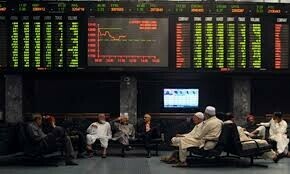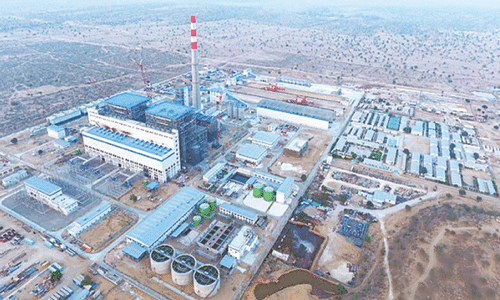Cement companies have invested in expanding operations in anticipation of burgeoning demand owing to construction activity under the China-Pakistan Economic Corridor and the growth in housing projects.
And the steel industry is catching up fast with the expected rise in demand.
As per international standards, every five tonnes of cement used in infrastructure projects require one tonne of steel. Around ten steel mills are listed on the Pakistan Stock Exchange (PSX), most of them having entered into the capital market between 2011 and 2017.
This represents the highest number of new listings during the six-year period in any one sector. The latest player seeking its way into the PSX is Iteefaq Iron Industries Limited. The company manufactures Re-bars and has the capacity to produce 120,000 tonnes per year, which is about 2pc share of the local market.
Steel companies expect to gain supply contracts related to the upcoming infrastructure projects under the CPEC umbrella. These include Orange Line, Karachi-Lahore Motorway and Neelum-Jehlum hydropower project among others.
Steel sector watchers say that the country’s steel demand is expected to rise at a 3-year (FY17-19) combined annual growth rate (CAGR) of 15pc compared to the last 3-year’s CAGR of 14pc.
“Considering that currently around 45pc of the country’s steel requirement is met through imports, local steel players have significant room for organic growth”, says a sector watcher.
“Considering that currently around 45pc of the country’s steel requirement is met through imports, local steel players have significant room for organic growth”
According to the World Steel Association (WSA), steel use in 2015 was 7.1 million tonnes in Pakistan, translating to per capita use of 37.5kg. Going forward, Pakistan’s steel requirement is expected to swell over 12m tonnes taking the country’s per capita requirement to 62kg by 2019.
Analyst Adnan Sami Sheikh at Topline Securities affirms that the demand for steel has been fuelled by a wave of capital expenditure aimed at capturing the swelling demand of quality steel products that will come about as a result of infrastructure projects such as power plants, dams, airports and road networks along with public and private housing schemes.
The specific steel produced to meet those demands is produced by Amreli Steel Limited (ASTL), Mughal Steel Limited (MUGHAL) and soon to be commenced by Dost Steels Limited (DSL).
Manufacturing growth led by investments in the auto and appliance sector is expected to spike demand for flat steel rolled by International Steels Limited (ISL) and Aisha Steel Limited (ASL).
And finally, the rehabilitation and expansion cycle in oil, gas and other industries, along with planned pipelines projects, would require huge quantities of steel pipes welded by Crescent Steel and Allied Products (CSAP), International Industries Limited (INIL) and Huffaz Seamless Pipes (HSPI).
According to analyst Waqar Uddin Salim at Summit Capital, Aisha Steel Mill Limited (ASL) is enhancing its plant by increasing Cold Rolled Coil (CRC) capacity to 450,000MT per annum from 220,000MT per annum.
The company is also introducing a new Galvanised product line (GI) with a capacity of 250,000MT per annum. “CRC demand in the local market is expected to remain buoyant due to a surge in automobile and home appliances demand attributable to a boost in economic activity”, he says.
Margins are important for steel companies. International steel prices have considerably retreated from March this year.
A June 15 report by Alfalah Securities observed that scrap currently trades at $250 per tonne, from $281 per tonne in March; HRC at $396 per tonne to $474 per tonne; Cold Rolled Coils (CRC) at $462 per tonne from $591 per tonne and Hot dipped galvanised coil (HDGC) at $548 per tonne to $640 per tonne.
As a result primary margins for CRC-HRC currently hover around $66 per tonne and HDGC-HRC margins are around $152 per tonne. Scrap prices in contrast have been comparatively stable and averaged at $242 per tonne.
It is noted that CRC-HRC and HDGC-HRC spreads are relevant for ASL and ISL whereas scrap prices are more pertinent to ASTL and Mughal.
Besides the escalating demand for steel in the local market, steel companies are banking on positive regulatory changes such as an increase in regulatory duty and imposition of anti-dumping duty.
The National Tariff Commission (NTC) has imposed anti-dumping duty in the range of 8-19pc on import of CRC, and 6-40pc on import of HDGC, to counter steel being dumped from China.
Topline Securities recalled that on January 19, the NTC imposed definitive anti-dumping duty in the range of 13.17pc-19.04pc on imports of Cold Rolled Coils/ Sheets importable from China and Ukraine for a period of five years.
Analysts at Intermarket Securities stated in their June 7 report that international steel prices have been plummeting sharply since Mar’17 owing to surging levels of iron ore inventories in China. Iron ore prices, which are down 36pc from March, will likely drag international CRC prices.
Key risks associated with the steel sector include withdrawal of anti-dumping duty by the government, adverse movement in HRC Cold Rolled Coil (CRC) spread in international market, power supply problems and slowdown in economic activity.
Published in Dawn, The Business and Finance Weekly, July 3rd, 2017















































